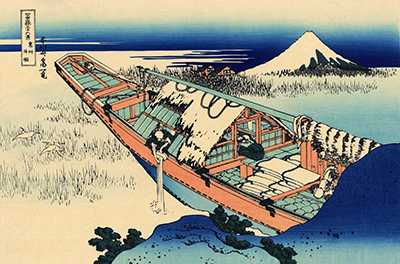Hokusai
Ushibori in Hitachi Province by Hokusai
This work is part of Hokusai’s most famous series of works called “Thirty-six views of Mount Fiji.” This contains many of Hokusai’s most memorable wood block paintings including his most famous piece “The Great Wave off Kanagawa.” It was published in 1831 by the famous publisher Nishimura Yohachi. This particular piece portrays the traditional lifestyle of the people who lived around Mt Fuji at the time of its creation.
This particular painting is a great example of how much Hokusai’s work evolved as he grew more experienced at his art form. Many of Hokusai’s early works that concerned humans tended to portray the upper echelons of society. These paintings mainly dealt with Actors and Courtesans. This was in line with the traditional subjects of these type of paintings. However, as time went on Hokusai moved from painting pictures of Artisans and Actors to painting works concerning the everyday life of the common folk.
This painting is a perfect example of this. The painting shows the impoverished fishermen who live around Mt Fuji fishing in traditional Japanese boats. It is a nice contrast to Hokusai’s prior works which tended to feature extravagant costumes and wealthy subjects. This painting also contrasts nicely with some of the other paintings in the collection. While Hokusai’s most famous paintings are mostly landscape paintings this one perfectly shows that Hokusai was skilled at painting both landscapes and people.
It is worth noting the relaxing atmosphere the composition produces. It would’ve been very easy for Hokusai to make the mountains in the background appear foreboding but thanks to his clever use of shading the scene appears far more relaxed. This is an excellent example of Hokusai’s work concerning people and a nice contrast to the landscape works that Hokusai is probably best known for. It truly shows Hokusai’s evolution as an artist. The painting is currently on display in The British Museum as part of the “Hokusai: Beyond the Great Wave,” exhibition.
